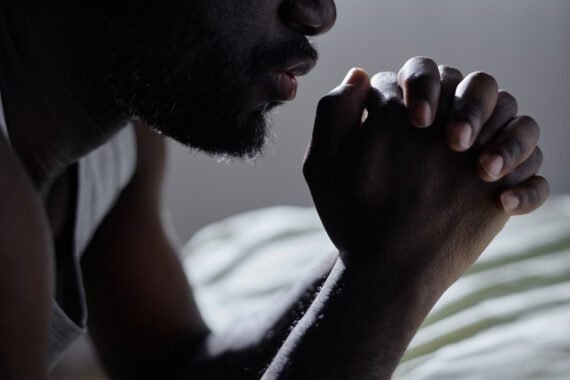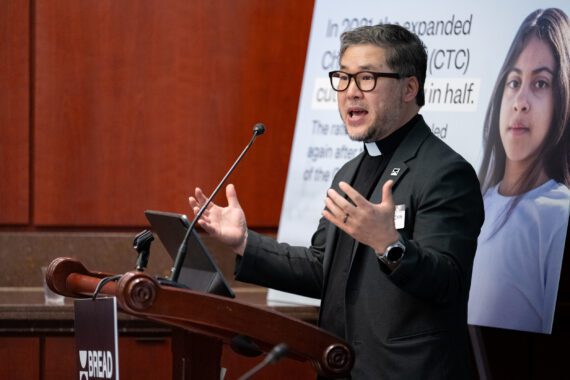As Bread for the World celebrates its 50th anniversary, the organization continues to advocate for effective policies to end hunger in the United States and around the world. Bread’s policy change agenda and campaign, Nourish Our Future (NOF), centers on ending hunger and malnutrition among children. Our international focus includes improving child nutrition through the Global Malnutrition Prevention and Treatment Act as well as reducing the impacts of debt distress and climate change on young people’s nutrition security and upholding the mandate of the UN Convention on the Rights of the Child. Bread’s U.S. domestic areas of focus include the Special Supplemental Nutrition Program for Women, Infants, and Children (WIC) and a Child Tax Credit expansion. Through this policy change agenda, Bread has the opportunity to address social policy issues that impact children in the U.S. and across the globe.
The work on debt distress continues Bread’s longstanding focus on debt, most notably our leadership role in the Jubilee 2000 campaign. The Jubilee year in the Bible was meant to happen every 50 years. It was intended to be a year of liberation – an economic, cultural, and environmental reset and an expression of God’s desire for all creation to flourish. The Year of Jubilee was a year for releasing people from their debts, releasing enslaved people, returning property to its owners, and resting the land. It honored the principle that God’s people have a part to play in setting things right.
Pope Francis has declared 2025 a Jubilee Year of Hope. Bread’s values of human flourishing also reflect the spirit of Jubilee. Between 2000 and 2015, the Jubilee campaign, including Bread and its coalition partners, secured $130 billion of debt cancellation for developing countries. Faith groups were the primary U.S. supporters of the Jubilee campaign. The role of faith leaders in encouraging members to contact their elected representatives about debt relief was pivotal. According to experts, the Jubilee campaign was one of the most successful movements aimed at ending poverty. However, there is still work to do. According to the U.K. advocacy group Debt Justice, “The campaign did not prevent debt crises [from] recurring. The same structural causes that led to the crisis remain in place.”
In keeping with the NOF campaign’s focus on putting children at the heart of our advocacy, Bread calls on the U.S. and other countries that make financial contributions to international financial institutions, such as the World Bank and the International Monetary Fund (IMF), to help alleviate debt burdens. This is particularly important in countries where child hunger is extremely high.
According to the U.N., more than 200 million children live in countries in debt distress or at high risk of falling into it and many of them are on the continent of Africa. The IMF lists 10 countries where children are impacted by debt distress: Sudan, the Republic of Congo, Ghana, Grenada, Lao People’s Democratic Republic, Malawi, São Tomé y Príncipe, Somalia, Zambia, and Zimbabwe. An additional 26 countries at high risk of debt distress are: Afghanistan, Burundi, Cameroon, Central African Republic, Chad, Comoros, Djibouti, Dominica, Ethiopia, The Gambia, Guinea-Bissau, Haiti, Kenya, Kiribati, Maldives, Marshall Islands, Micronesia, Mozambique, Papua New Guinea, Samoa, Sierra Leone, South Sudan, St. Vincent and the Grenadines, Tajikistan, Tonga, and Tuvalu.
Bread also calls on policy makers to urgently address the adverse impact of climate change on children in hunger hotspots, where the effects of the La Niña weather pattern is exacerbating food insecurity and causing devastating floods in countries like Nigeria and South Sudan, and contributing to dry conditions in Somalia, Kenya, and Ethiopia.
Climate financing is important for addressing climate injustice. Extreme weather events in hunger hotspots pose a threat to children’s lives, their access to food and nutrition security, ability to go to school, and ability to grow up in a healthy and safe environment. The continent of Africa is projected to enjoy a population boom from its current 1.5 billion to 2.5 billion by 2050, with its youth population already the largest in the world and projected to double to over 830 million.Extreme weather events threaten already fragile food systems in Africa, putting millions of children at risk of hunger.
About a decade before the founding of Bread, in his Nobel Peace Prize acceptance speech, the Reverend Dr. Martin Luther King Jr. said “I have the audacity to believe that people everywhere can have three meals a day for their bodies, education and culture for their minds, and dignity, equality, and freedom for their spirits.” This was about a year after his history making “I have A Dream Speech” which Bread’s founder Reverend Art Simon attended in Washington, D.C. and indicated was a pivotal moment in his formation as an up and coming activist in the movement for justice and equality.
The spirit of audacity that Dr. King speaks about is aspirational, and it is one that continues to inspire Bread for the World’s 300,000 grassroots supporters to keep working towards the end of hunger, to keep caring for our climate and God’s creation, and to keep underscoring the injustice of unconscionable debt in the lives of God’s children through advocacy for equitable policies.
Whether through God’s divine request or his divine appointment, as the Honorable Shirley Chisholm articulated, “You don’t make progress by standing on the sidelines, whimpering and complaining. You make progress by implementing ideas.” Congresswoman Chisholm (D-NY) did not just talk about it, she was about putting ideas into action as the first African American woman to be elected to Congress in 1968. She paved the way for Black women in U.S. politics and played an essential role in the creation of one of Bread’s NOF domestic policy passions – WIC, ensuring that low-income mothers everywhere in the U.S. could access free, healthy food for their young children. Thanks to her ground laying work, Bread and its supporters can continue to work to empower families across rural and urban America through our advocacy to protect WIC for children and women.
In the faith and global space, Representative Chisolm’s clarion call to not stand by the sidelines was echoed recently at a summit with international financial leaders and policy makers, where Pope Francis warned against what he described as the globalization of indifference. He encouraged the cancellation of debts. Debt accumulation is often caused by the impact of climate change and injustice, causing unbearable sacrifices by millions of children who are mired in extreme poverty and lack food, housing, medical care, schools, electricity, drinkable water, and sanitation services.
In a world of abundance, climate and debt injustice should not be causing hunger and malnutrition among our children. In a world of abundance, Bread and its 300,000 supporters will continue to advocate for just policies. In a world of abundance, we urge policy makers in the U.S. and across the globe to be resolved to work with Bread and other partners on God’s important mandate for all children: flourishing.
Learn more about what you can do to partner with us on human flourishing at www.bread.org.
Abiola Afolayan is director, Policy and Research Institute, with Bread for the World.



